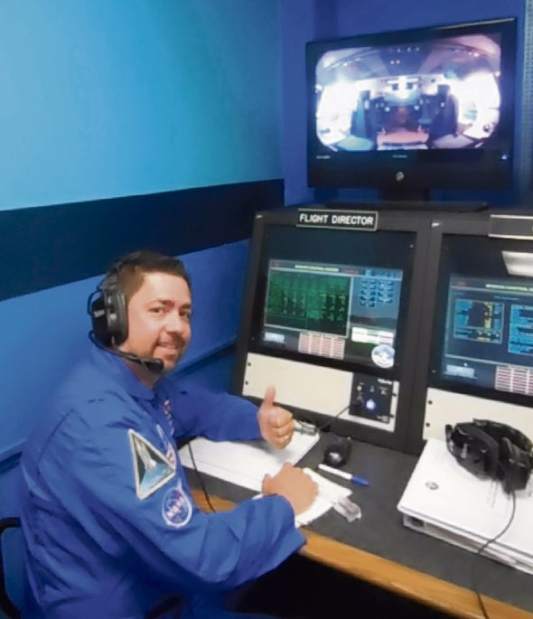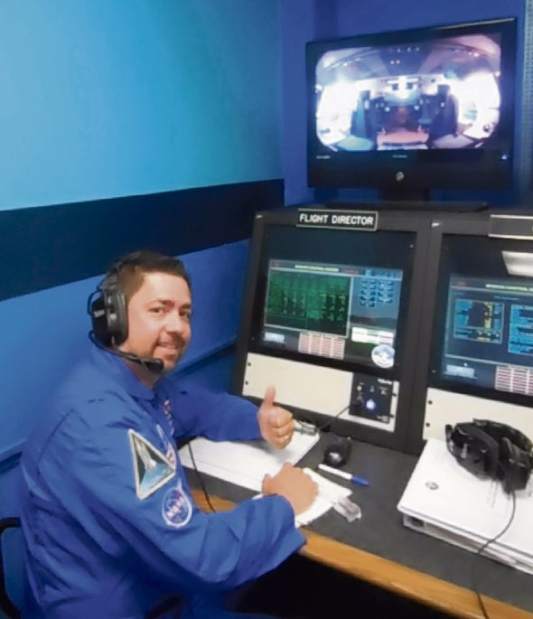From Mars to Carnegie, fifth grade teacher uses real-life lessons for students
On the first day of each school year, Scott Donnelly tells his Carnegie Elementary fifth-grade students he lives in Mars.
Donnelly shows pictures of himself posing by a flying saucer, telling students that's how he gets to work each day.
“Some fifth-graders want to go on the roof for me to prove it,” he said.
Of course, Donnelly might be from Mars, but he's not from that Mars. He lives in the Butler County borough of the same name.
But the literal “out-of-this-world” trip to that Mars is in the realm of possibility for today's pre-teens.
“As many people know, Mars is the next goal for NASA,” Donnelly said. “In fact, all the experts are saying students in middle school right now will probably be the ones going on that initial manned trip to Mars. I use that thought as the hook to get my students interested in the current state of space exploration.”
In June, Donnelly received a full scholarship to attend Honeywell Educators at Space Academy in Huntsville, Ala. There, he took part in hands-on activities, challenges and lessons he can adapt to his own classroom teaching. Those selected for the program participated in 45 hours of classroom and laboratory instruction which included a high-performance jet simulation, coding systems to launch rockets, land and water survival training and interactive flight dynamics programs.
“Sure it's easy to search online for STEM activities, but to do them from the students' point of view is invaluable,” Donnelly said. “It's like beta-testing the lesson followed up by a discussion with teachers of all backgrounds from all around the globe. Personally, these sessions inspire and invigorate what's been my teaching philosophy since day one — to incorporate real-world topics and learning in the classroom.”
Space exploration has been a passion for Donnelly since he was a child. He remembers seeing a copy of a local newspaper heralding the Apollo 11 Lunar Mission stashed away in a storage closet in his house. More recently, his interest has increased because a close friend of his is a rocket scientist, who has worked on space shuttle missions and is now working on the Space Launch System for the Mars expeditions.
Donnelly plans to use his summer experience to build on a science curriculum where space exploration is usually limited to the historical aspects of the moon landing and maybe some current happenings with the International Space Station. Through the program in Alabama, Donnelly now can connect with 16 other teachers who were in his summer class to compete in several space missions with their students.
“The international team will have their classes contribute to a space mission by sharing information on Google Docs,” Donnelly said. “I believe my fifth-graders will be so engaged in this project when seventh-graders from Turkey, sixth-graders from Washington, and students from Malaysia are all adding their particular subject expertise to our ‘mission.' Students still need to learn the traditional science concepts, but they learn them without science books in my classroom. They learn by ‘doing' science, not reading about it.”
In July, Donnelly continued his summer training by attending an Engineering is Elementary course at the Boston Museum of Science. In 2015, Donnelly attended the Mickelson ExxonMobil Teachers Academy in Texas.
Engineering, historically, has not been presented at the elementary level, but Donnelly feels it is important to offer an introduction to the field because of the projected shortage of engineers in 10 to 15 years.
“The engineering design process is something that students take with them everywhere in life — collaboration, thinking outside the box, and failing are all important experiences in my classroom,” Donnelly said. “Most of the challenges and lessons presented to us at the space academy required those engineering principles.”
Matthew Peaslee is a Tribune-Review contributing writer.


